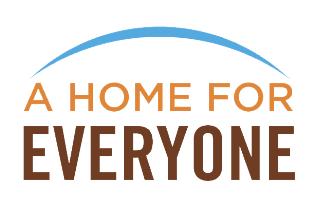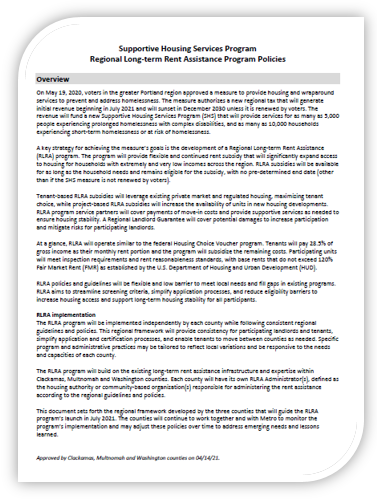REGIONAL LONG-TERM RENT ASSISTANCE PROGRAM
Long-term Rent Assistance will be a significant component of the Metro Supportive Housing Services (SHS) Program, providing housing stability to thousands of households across the region.
The Regional Long-Term Rent Assistance (RLRA) program provides a regional framework for the administration of rent assistance to ensure consistency for landlords, service providers and participants, while also allowing counties to independently implement the program based on local priorities.
The RLRA program will provide a rent subsidy to qualified low-income tenants and allow for private landlords in Clackamas, Multnomah and Washington counties to rent apartments and homes to these tenants at fair market rates. The program is similar to the federal Section 8 or Housing Choice Voucher program, but it is funded locally through the SHS Program.
In Multnomah County, the RLRA program will be managed by Home Forward, the Housing Authority of Portland. Home Forward will approach administrating the funds by delivering rent assistance directly, aligned with external services, or by working with community-based organizations to deliver both rent assistance and supportive services. Follow this link, or click the image to the right to read the policies directly.
HOW WERE THE POLICIES DEVELOPED?
These policies build upon existing policies developed for Home Forward’s local Long-Term Rent Assistance Program, with flexibility incorporated in order to address changing needs and lessons learned. They were developed by a regional workgroup facilitated by Metro that included staff members from the Joint Office of Homeless Services, Home Forward, the Portland Housing Bureau, and Washington and Clackamas Counties.
The policies incorporate feedback from over 110 stakeholders collected through an online survey, focus group, and by email. An overview of the feedback is available on Metro’s website.
POLICY HIGHLIGHTS
Counties will be held accountable for ensuring referral pathways are equitable, inclusive and effective
Eligibility is tied to SHS Program requirements
No participant screening beyond verifying that a household isn’t already receiving RLRA
Documentation requirements will be flexible to minimize barriers
Subsidy will be available for as long as a household needs and remains eligible for the program, with no predetermined end date (other than if the SHS measure is not renewed by voters)
Units must meet rent reasonableness standards and not exceed 120% of Fair Market Rent (FMR)
Household members can be added to an RLRA contract at any time as long as the household still meets income eligibility and unit capacity requirements and landlord agrees to add to lease.
Commitment that program partners will work together to preserve participant access to the program and avoid termination unless absolutely necessary
A regional landlord guarantee will be established to provide assurances to participating landlords. This is in development and we will share updates as we have them.
QUESTIONS?
The Joint Office of Homeless Services welcomes your questions and comments about the implementation of the RLRA Program. If you are a community member seeking rent assistance, contact 211info by dialing 2-1-1 or calling toll free at 866-698-6155. You can also learn more about affordable housing opportunities through Home Forward.
INITIAL PROJECTS
Housing projects and programs aligned with this funding that are launching in Fiscal Year 2022 include:
Renaissance Commons: 30 units of Permanent Supportive Housing (PSH) in partnership with REACH & the Urban League
Cedar Commons: 30 units of PSH in partnership with Central City Concern (CCC) & Multnomah County’s Behavioral Health Division
Assertive Community Treatment (ACT) Participants: tenant-based RLRA for ACT participants experiencing homelessness
Senior Housing: tenant-based RLRA for seniors with disabling conditions in partnership with Northwest Pilot Project, Native American Rehabilitation Association (NARA) and CCC.
COVID 19 High Risk Households: tenant-based RLRA for households served in high-risk COVID-19 motel shelters in partnership with motel operators and culturally-specific providers.

